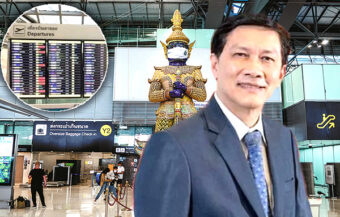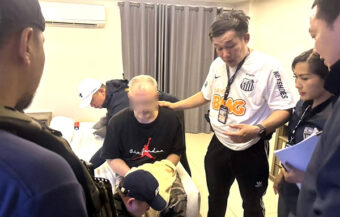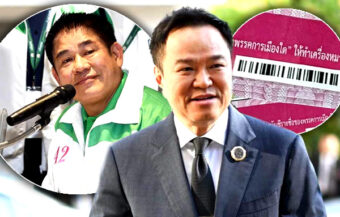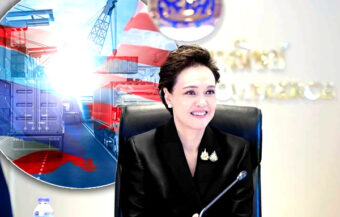Cobras emerge from Pheu Thai as Anutin gains Kla Tham backing, yet People’s Party doubts cast uncertainty over his premiership bid. Defectors, protests, grassroots sentiment and old alliances could help decide Thailand’s next Prime Minister in a high-stakes political showdown this week in the House of Representatives.
Bhumjaithai leader Anutin Charnvirakul gained a boost on Saturday with Kla Tham Party backing, while five “cobra” defectors left Pheu Thai. Yet Pheu Thai is courting the People’s Party to back Mr. Chaikasem Nitisiri, keeping Anutin’s path uncertain. Pro-democracy critics are alarmed, citing his past support for junta generals and resistance to constitutional reform. Every defector counts, every move matters, and raw political sentiment could still derail his premiership bid.
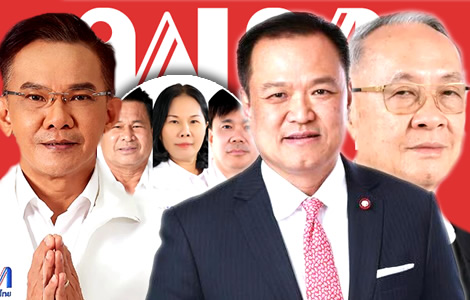
On Saturday, former Deputy Prime Minister and Interior Minister Anutin Charnvirakul gained momentum in his bid to become Prime Minister next Wednesday. However, he also saw the brakes applied to the central part of his gambit. Significantly, the support of the People’s Party for over half the 280 votes needed was placed in doubt.
Firstly, the Kla Tham Party confirmed its support for Mr. Anutin as Prime Minister in next Wednesday’s House vote. Certainly, this was all the more significant because party leader Narumon Pinyosinwat had remained non-committal on Friday night. Later, the party executive unanimously endorsed the decision.
Consequently, Mr. Anutin’s coalition prospects strengthened. Meanwhile, analysts noted that uncertainty remained as attention turned to the prospect of 15–17 Pheu Thai Party cobras. There are, of course, defectors.
Kla Tham Party endorsement and Pheu Thai cobras create momentum for Anutin’s bid to become prime minister
Defections from the Pheu Thai Party began with Kanchanaburi MP Sakda Wichiensin. He joined Mr. Anutin at a press conference at Bhumjaithai Party headquarters. Additionally, Kla Tham Party leaders were present, signalling formal cooperation. Following the event, Mr. Sakda was removed from the Pheu Thai Party LINE group.
Subsequently, four more MPs left or were expelled. These included Sisaket MP Dr. Phumin Leethiraprasert, who publicly stated he could not support Mr. Chaikasem Nitisiri as Prime Minister. The latter is Pheu Thai’s third and last prime ministerial nominee under the country’s convoluted and politically oppressive 2017 Constitution.
Dr. Phumin explained his decision thoroughly. Firstly, Sisaket province had been severely affected by Cambodian bombardments from July 25 to 28. Secondly, he criticised Pheu Thai governance over the last two years. In particular, rice, cassava and cattle prices had collapsed.
Furthermore, the leaked “Uncle” video illustrated systemic government mismanagement. In addition, the Constitutional Court’s verdict removing the former Prime Minister confirmed governance failures. Consequently, Dr. Phumin argued that Pheu Thai leadership should not form a government or further harm the nation.
Additional Pheu Thai MPs consider backing Anutin while People’s Party debates progressive faction support
At the same time, 10 to 12 additional Pheu Thai MPs are reportedly considering support for Mr. Anutin. However, analysts warn that his premiership bid is fragile. Significantly, there are growing calls within the People’s Party urging the progressive party to shun Mr. Anutin.
They cite his ties with General Prayut Chan-o-cha and his role in government from 2019 to 2023. Additionally, the Bhumjaithai Party’s attempts to centralise power and block constitutional reform remain controversial.
Meanwhile, investigations continue into the 2024 Senate election. Both the Election Commission and the Department of Special Investigation are examining alleged irregularities, implicating the Bhumjaithai Party. As a result, scrutiny over conservative and nationalist factions supporting Mr. Anutin has intensified.
Nevertheless, conservative-led protests are amplifying his candidacy. Presently, these protests explicitly aim to prevent the Pheu Thai Party from forming a government.
Conservatives and Jatuporn protest at Victory Monument, aiming to block Pheu Thai and boost Anutin’s bid
On Sunday, former Redshirt leader Jatuporn Prompan and his group, United Power of the Land to Protect Sovereignty, will gather at Victory Monument. Previously, this year, such protests, including remnants of the Yellow Shirt movement, failed to gain traction.
Consequently, analysts suggest public fatigue and economic concerns may limit participation. Furthermore, citizens remain wary because political instability has been shown to damage the economy and Thailand’s long-term prospects.
Photographs on August 30 showed Mr. Anutin and Kla Tham Party leader Lt. Col. Thammanat Prompao celebrating at Bhumjaithai Party headquarters. Subsequently, they issued a statement endorsing Mr. Anutin as the 32nd Prime Minister.
Meanwhile, other leaders, including Mr. Santi Promphat of Palang Pracharath, Mr. Suchart Chomklin of the Ruam Thai Sang Chart breakaway group, Mr. Suratin Picharn of New Democracy and Mr. Niphon Bunyamanee, former Democrat minister, reportedly discussed forming an interim government.
Cobra members from Pheu Thai leave party to support Anutin and disrupt parliamentary calculations
The emergence of “cobra members” from Pheu Thai has reshaped parliamentary calculations.
Sakda Wichiensin led the initial defection, followed by Mr. Prasert Bunruang, MP for Kalasin; Pol. Lt. Gen. Surapol Bunma, MP for Nakhon Nayok; Dr. Phumin Leethiraprasert, MP for Sisaket; and Ms. Nuchnat Charuwongsathian, MP for Sisaket.
Party insiders revealed the MPs had awaited the right moment to leave. When the timing was right, they acted decisively.
Dr. Phumin outlined why he would not support Mr. Chaikasem. Firstly, Pheu Thai policies largely failed over the last two years. Secondly, agricultural prices collapsed, causing hardship. Thirdly, border clashes along the Thai-Cambodian frontier resulted in civilian deaths and property damage.
In addition, the leaked “Uncle” video exposed governance failures. Finally, the Constitutional Court’s removal of the former Prime Minister confirmed government weakness. Consequently, Dr. Phumin pledged to prioritise national stability over party loyalty.
As a result, he indicated support for Mr. Anutin instead. Furthermore, he emphasised that voters, not failed party elites, should determine the next government.
Next House session will test coalition strength as MPs vote for Thailand’s next prime minister on Wednesday
The upcoming House of Representatives session is crucial. From Wednesday to Friday, MPs will vote for a new Prime Minister. Bhumjaithai leader Anutin claims majority support, yet Pheu Thai disputes this. Additionally, the People’s Party, the largest parliamentary bloc, said it has no agreements with either proposed coalition.
Furthermore, leader Natthaphong Ruengpanyawut emphasised the party will remain in opposition, even if backing a candidate. People’s Party lawmakers will meet on Monday to finalise their strategy.
Street protest leaders, in the meantime, are ramping up the pressure. Jatuporn Prompan stated that ousting former Prime Minister Paetongtarn Shinawatra is not a victory. Instead, it merely changes the leadership’s face. Furthermore, he warned that a Pheu Thai nomination would continue the same group’s control. Additionally, Pichit Chaimongkol said the group would resist Pheu Thai’s attempts to form a government.
The protest group outlined six key demands. First, no Pheu Thai candidate for Prime Minister should be allowed. Second, no constitutional amendments should affect royal prerogatives. Third, MoUs 43 and 44 with Cambodia must be cancelled.
Fourth, the draft Property Leasing Act, extending leasehold rights for foreigners from 30 to 99 years, must be withdrawn. Fifth, the Integrated Entertainment Business Act, which legalises casinos, must be withdrawn. Sixth, the draft Financial Business Hub Act should be withdrawn to prevent foreign financial dominance.
Dynamics remain fragile with conservative protests and sentiment affecting Anutin and Pheu Thai strategies
Additionally, analysts highlighted that coalition dynamics remain fluid. As a result, every MP’s decision could affect government formation. Conservative protests increase visibility but risk alienating moderates.
Meanwhile, scrutiny over governance failures continues to weigh on Mr. Anutin’s prospects. Public sentiment is cautious, reflecting fears of instability and economic damage.
Moreover, the vote will test minor parties’ negotiating power. Mr. Anutin relies on Kla Tham support and defecting Pheu Thai MPs. However, his past association with the former junta’s leadership and legal investigations complicate his path.
Certainly, among progressive People’s Party MPs, there are questions about supporting Anutin’s bid. Meanwhile, Pheu Thai must manage internal defections and rising public opposition. Consequently, both parties are rushing to consolidate coalitions ahead of the House vote.
Notably, the Pheu Thai Party and People’s Party are more aligned as pro-democracy parties. Polls have shown that support for the Pheu Thai Party has dropped. At the same time, this support has moved to the People’s Party. Both parties, according to the latest National Institute of Development Administration (NIDA) polls, enjoy 65% support.
Prime ministerial vote will determine Thailand’s governance stability and public confidence in democracy
Ultimately, the vote will select the next Prime Minister and signal Thailand’s capacity to manage political instability. Moreover, it will determine public trust in parliamentary governance.
Meanwhile, citizens are closely watching protest activity, party manoeuvres and negotiations. Additionally, this is a parliamentary battle for power. In turn, the outcome will determine who leads Thailand’s interim government, but more importantly for stability, whether power can be returned to the people alongside badly needed constitutional reform. The 2017 Constitution is at the root of what is now an ongoing political crisis.
Finally, Mr. Anutin’s bid illustrates old politics in Thailand. This is an interplay of party loyalty, defections or “cobras,” well-timed street protests and coalition-building efforts often not based on principle.
Pheu Thai and the People’s Party to talk about an Orange Red alliance to elect Chaikasem Nitisiri as PM
Pheu Thai rattled by PM’s ouster. Risks complacently assuming the Premiership of Chaikasem Nitisiri
Anutin plays his hand for the Premiership, but only one thing is sure. Thailand is in a political crisis
PM Paetongtarn Shinawatra ousted by Constitutional Court, collapsing Thai government over audio clip
Additionally, his dependence on the People’s Party for half his support highlights the fragility of his bid. Support from Kla Tham and defecting MPs strengthens his position. However, there is still a sense that this is a gambit.
Undeniably, the outcome will shape Thailand’s governance and political future for years. The key decision will come after Monday’s meeting at People’s Party headquarters. The remnants of the party that won the 2023 General Election are now, unquestionably, the kingmaker.
Join the Thai News forum, follow Thai Examiner on Facebook here
Receive all our stories as they come out on Telegram here
Follow Thai Examiner here
Further reading:
Pheu Thai rattled by PM’s ouster. Risks complacently assuming the Premiership of Chaikasem Nitisiri
PM Paetongtarn Shinawatra ousted by Constitutional Court, collapsing Thai government over audio clip
Prime Minister Paetongtarn Shinawatra a no-show at cabinet and an appointment with Pheu Thai MPs




